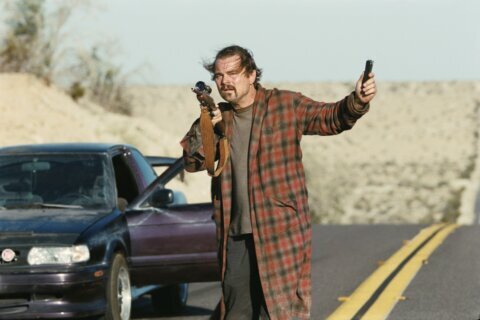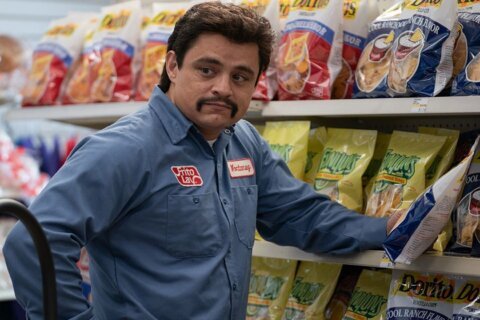WASHINGTON – He’s brought us such gems as “Up in the Air” (2008), “Juno” (2007) and “Thank You For Smoking” (2005).
Now, director Jason Reitman tries his hand at suspenseful romance in “Labor Day,” a title with a double plot meaning that never quite gels.
In fact, the title carries a triple meaning in that the contrived plot points are laborious to get through.
Based on a 2009 novel by Joyce Maynard, the film follows a depressed single mom named Adele (Kate Winslet) who raises her shy 13-year-old son, Henry (Gattlin Griffith), in 1987 New Hampshire.
One day at the local store, they encounter an escaped murder convict named Frank (Josh Brolin), who’s out of breath and bleeding from his midsection. Frank strong-arms a ride home, ties them up and insists they allow him to stay there in hiding.
To their surprise, he proceeds to fix the toilet, change a flat tire, cook a pot of chili, bake a pie, mop the floor and perform a number of household chores during the long Labor Day weekend.
As Stockholm Syndrome kicks in, the awkward Henry looks to Frank as a father figure, while the lonely Adele falls for him in a romance surely doomed by the “Wanted” posters hanging around town.
Reitman has long since proven he’s an actor’s director, having coached actors to four Oscar nominations (Ellen Page, George Clooney, Vera Farmiga and Anna Kendrick) and six Golden Globe nominations (Aaron Eckhart, Page, Clooney, Farmiga, Kendrick and Charlize Theron).
Once again, he rounds up a deep supporting cast, including J.K. Simmons (the dad from “Juno”), Tobey Maguire (“Spider-Man” himself), Clark Gregg (Agent Coulson from “The Avengers”) and Brooke Smith (Buffalo Bill’s prisoner in “The Silence of the Lambs”). Outshining all of them is young Gattlin Griffith, who is quite good in his believable coming-of-age timidity.
Still, this film belongs to its two leads, Brolin and Winslet, who do everything in their power to carry the emotions of this tricky story. The duo mines sexual tension with a glance here, a touch of the hand there. I almost expected “Unchained Melody” to play as Winslet and Brolin kneaded dough with overlapped hands like Patrick Swayze and Demi Moore on the pottery wheel in “Ghost” (1990).
Brolin proves he’s as strong an on-screen presence as we have in the movies today, giving an edgy performance more in line with “No Country for Old Men” (2007), “Milk” (2008) and “True Grit” (2010) than his most recent trio of “Men in Black 3” (2012), “Gangster Squad” (2013) and “Oldboy” (2013).
As for Winslet, she proves we’ll watch her in anything, giving yet another stellar, Golden Globe-nominated performance. Her sexual yearning recalls her Oscar-winning role in “The Reader” (2008), her shaking hands recall the frigid waters of “Titanic” (1997) and her child-bearing tragedy recalls her Golden Globe-winning abortion in “Revolutionary Road.”
Unfortunately, there’s nothing revolutionary here.
If you’re intrigued by the notion of a criminal outsider coming to live with a small-town family, check out Hitchcock’s “Shadow of a Doubt” (1943).
If you crave criminal lovers fueled by sexual repression, go rent “Bonnie and Clyde” (1967).
And if you’re in the mood for a long romantic weekend, Meryl Streep and Clint Eastwood did it much better in “Bridges of Madison County” (1995).
“Labor Day” has its moments, for sure, particularly during Henry’s encounters with a spunky young girl (Brighid Fleming) in the grocery store, the library and on the rocks under a bridge. These are the moments where Reitman reminds us that his father was the director of ’80s comic gems from “Stripes” (1981) to “Ghostbusters” (1984). Speaking of the ’80s, Reitman does a nice job of capturing the 1987 atmosphere, with posters of “The Empire Strikes Back” (1980) and “E.T.” (1982) on Henry’s walls and “Close Encounters of the Third Kind” (1977) playing on the television.
But try as Reitman might, the script problems are already baked in the cake, or should we say, baked in the pie. As much as Winslet and Brolin act their tails off, the dialogue doesn’t do them any favors. The writing is melodramatic, cheesy and on-the-nose. The flashbacks are awkward, with confusing transitions and a forced backstory. Most of all, the Tobey Maguire narration is unnecessary, feeling more like a bad Nicholas Sparks adaptation than something worthy of Reitman’s obvious talents.
For a brief moment, I thought Reitman was working a twist where Frank would turn out to be Adele’s ex-husband and Henry’s long-lost father. Instead, we meet Henry’s actual absent father in a subplot that is much weaker than a similar subplot in last year’s indie gem “The Spectacular Now” (2013), which was written by the talented screenwriters of “(500) Days of Summer” (2009).
Perhaps the biggest problem may be the constraints of the setup, a common trope that sitcoms call the “Bottle Episode,” where external elements “bottle up” the characters and force them to work out their issues. You might remember the “Family Matters” episode where Carl and Urkel get caught on a subway train on Christmas Eve; or the “Home Improvement” episode where Tim and Al are stuck ice fishing. The concept was more recently spoofed in the “Community” episode titled “Cooperative Calligraphy.” While this can work well in a half-hour TV sitcom, it’s much harder to do in a two-hour movie. “12 Angry Men” (1957) and “The Big Chill” (1983) are rare exceptions.
A Labor Day release would have made more sense from a marketing standpoint, but it’s clear to see why this one was released in late January. If the filmmakers were really pleased with the outcome, they would have released it a month earlier during the Oscar race. They must have suspected.
I’m still excited to see what Reitman tries next. His track record speaks for itself. But when you pair a proven director with such a stellar cast, audiences expect — and deserve — much better than this.
Bummer.
★ ★ 1/2
The above rating is based on a 4-star scale. Follow WTOP Film Critic Jason Fraley on Twitter @JFrayWTOP, read his blog The Film Spectrum or listen Friday mornings on 103.5 FM.
Follow @WTOP and @WTOPliving on Twitter.








